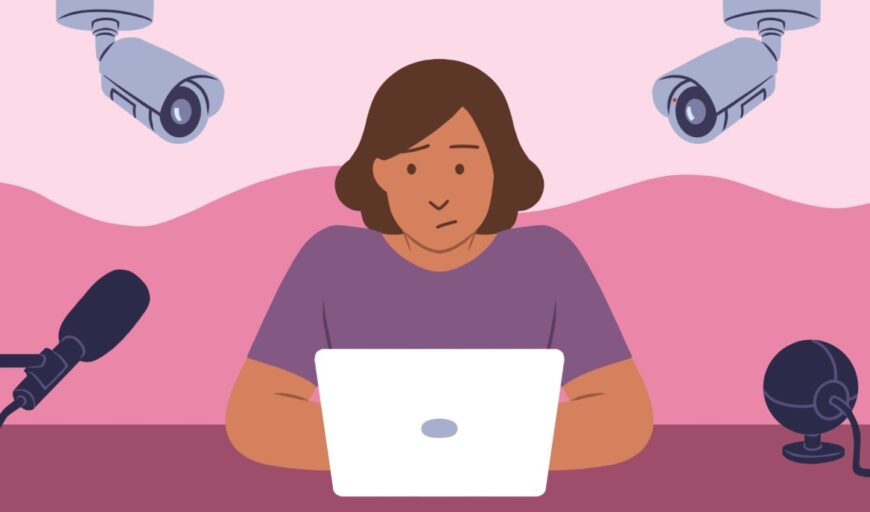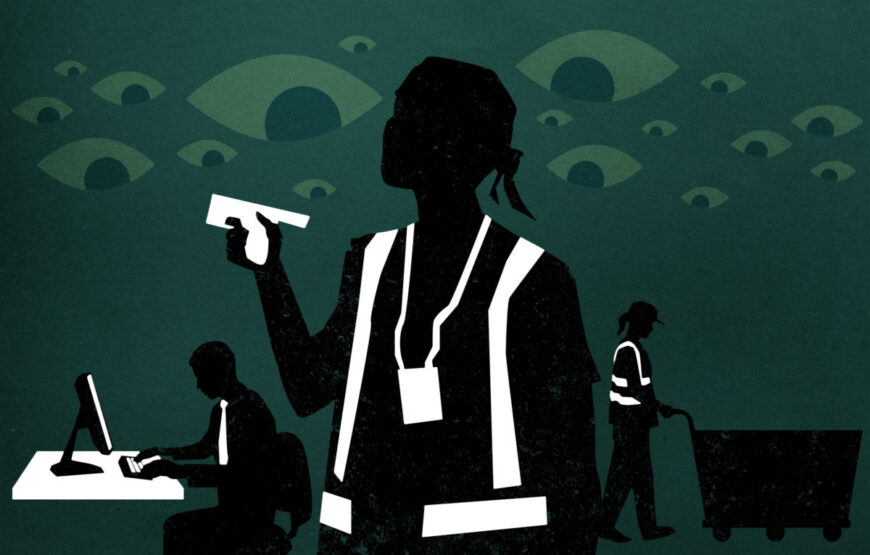In employee surveillance, the lines between productivity and privacy blur in the digital landscape of the modern workplace. In an era where remote work has become the norm, the rise of employee surveillance tools is both a testament to technological advancements and a cause for contemplation.
A survey says 78% of businesses, as reported by PC Mag, are employing some form of employee surveillance software, ushering in a new era of oversight.
From screen monitoring tools scrutinizing every click to GDPR compliance dashboards claiming to protect privacy, the narrative unfolds with complexities.
But as we journey through this exploration, it’s not just about statistics and software; it’s about the psychological toll on employees, the legal intricacies, and the emerging technologies shaping the future.
What is Employee Surveillance?

Employee surveillance is the systematic monitoring of employees’ activities, both online and offline, within the workplace. This practice involves the use of various tools and technologies, ranging from screen monitoring software to GPS tracking, aimed at tracking work-related tasks and, in some cases, behaviors outside the professional realm.
The goal is often framed as enhancing productivity, ensuring compliance with company policies, and safeguarding sensitive information.
However, the ethical implications of employee surveillance are profound, as it raises concerns about privacy, autonomy, and the psychological impact on the workforce.
Balancing the need for oversight with the rights of individuals in the digital age has become a critical challenge for employers and employees alike.
The Growing Trend
To truly comprehend the scope of employee surveillance, we turn to statistics. According to a recent report by PC Mag source, a staggering 78% of businesses have embraced some form of employee surveillance software.
This seismic shift in the workplace dynamic raises eyebrows and questions about the extent of intrusion into employees’ professional and personal lives.
Screen Monitoring Tools
One of the prominent players in this surveillance game is screen monitoring tools. The promise is increased productivity, but at what cost? These tools track every move, every keystroke. The data they collect creates a digital dossier on employees, prompting the question: Is this oversight or an invasion of privacy?
GDPR Compliance Dashboard
Enter the General Data Protection Regulation (GDPR). Ostensibly, it stands as a guardian against privacy breaches. But do companies truly adhere to its principles? We delve into the complexities of the GDPR compliance dashboard, exploring whether they are a genuine protection mechanism or a mere checkbox exercise.
The intersection of GDPR and employee surveillance is a critical space to examine.
In the sector of screen monitoring tool, Controlio emerges as a noteworthy presence. This software not only tracks activities but also raises questions about the ethical use of such tools.
Statistical Insights
Statistics often tell a story, and a recent survey conducted by an employment research institute paints a vivid picture. A staggering 65% of employees express discomfort with the notion of being under constant surveillance.
Moreover, 42% feel that this surveillance has a detrimental impact on their job satisfaction. These numbers underscore the need for a nuanced discussion on the ethical implications of employee monitoring.
Key Factors of Employee Surveillance

The Human Factor
Beyond the jargon and statistics, there lies a fundamental question: are these surveillance measures ethically sound? The human factor is often lost in discussions of compliance and efficiency. We delve into the delicate equilibrium between employer interests and the fundamental right to privacy. How do we strike a balance in this evolving digital landscape?
The Psychological Impact
While the numbers shed light on the discomfort employees feel, the psychological toll of constant surveillance is often underestimated. Studies indicate a link between pervasive monitoring and increased stress levels among employees.
The sense of being under constant scrutiny can lead to anxiety, affecting both the mental well-being and productivity of the workforce. Employers need to be mindful of this human element as they navigate the fine line between oversight and intrusion.
Legal Ambiguities
The legality of employee surveillance is a labyrinthine path. The GDPR serves as a beacon, but its application and interpretation vary. As companies deploy GDPR compliance dashboards to showcase adherence, the effectiveness of these mechanisms remains uncertain.
The legal landscape is evolving, and navigating this maze requires constant vigilance to ensure that both employers and employees are on the right side of the law.
Industry Variances

The prevalence and acceptance of employee surveillance vary across industries. While tech and finance might see it as a necessary evil for security reasons, creative industries might view it as a breach of the autonomy needed for innovation.
Understanding these industry nuances is crucial for crafting policies that respect the unique dynamics of each sector.
Emerging Technologies
As technology advances, so do the tools at the disposal of employers. Artificial intelligence and machine learning are making their way into employee surveillance, raising questions about the ethical implications of predictive monitoring.
What happens when your boss knows you’re about to burn out before you do? The advent of such technologies adds another layer to the already complex discourse around employee surveillance.
Employee Rights
Amidst the surveillance uproar, the importance of championing employee rights cannot be overstated. Unions and advocacy groups are becoming more vocal in pushing for transparent and ethical monitoring practices. The digital era demands a reevaluation of what privacy means in the workplace, with a focus on empowering employees to assert their rights.
The Future of Employee Surveillance
As we gaze into the future, the trajectory of employee surveillance remains uncertain. Will it evolve into a nuanced, balanced approach that respects both employer and employee needs, or will it tip into an Orwellian dystopia?
The conversation around the ethical use of surveillance tools must continue, involving all stakeholders in shaping policies that promote a healthy work environment.
Conclusion

The world of employee surveillance is a dynamic landscape with multifaceted dimensions. It involves not just technology and statistics, but the very fabric of human interaction within the workplace.
One that acknowledges productivity while safeguarding individual rights becomes paramount. Employee surveillance is not a black-and-white issue; it exists in the shades of gray where technology and humanity intersect.




